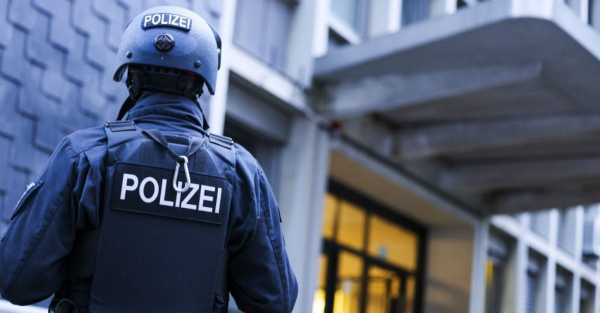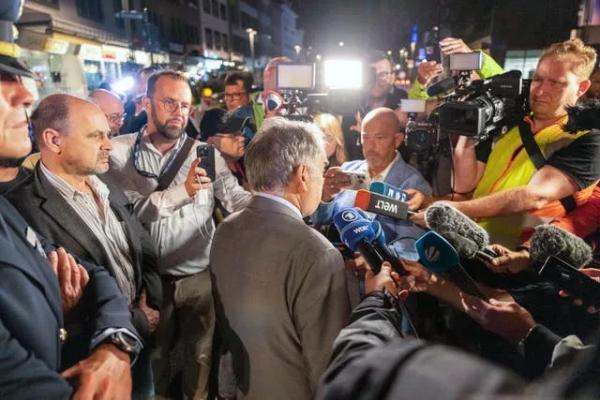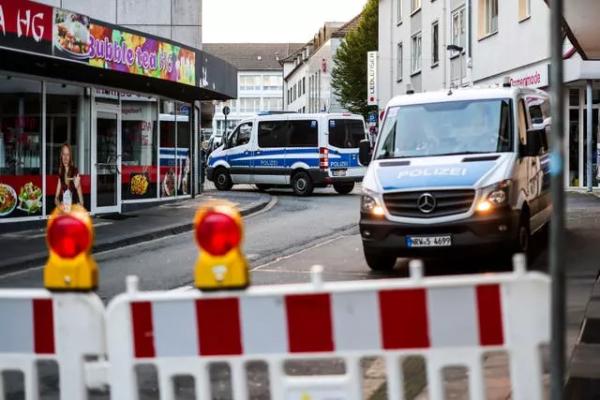
German police have detained a suspect in the Solingen knife attack that killed three people, an official has said.
“We have been following a hot lead all day,” Herbert Reul, the state internal affairs minister of North Rhein Westphalia, told Tagesschau, the news programme of the German public television network ARD.
“The person we have been searching for all day has been detained a short while ago,” he said.
He was being questioned, Mr Reul said, adding police not only have “clues” but also have collected “pieces of evidence”.
It comes after the Islamic State (IS) militant group claimed responsibility for the attack, which also wounded eight others at a crowded festival marking the city’s 650th anniversary.
The group said Saturday on its news site that the attacker targeted Christians and is a “soldier of the Islamic State” who carried out the assaults Friday night “to avenge Muslims in Palestine and everywhere”.
The IS claim could not immediately be verified. No evidence for the group’s assertions was provided.
Officials earlier said a 15-year-old boy was arrested early on Saturday. Police said he was suspected of knowing about the planned attack and failing to inform authorities, but he was not the attacker.
The three people who died were two men aged 67 and 56 and a 56-year-old woman, authorities said. Police said the attacker appeared to have deliberately aimed for his victims’ throats.
Markus Caspers, senior public prosecutor from the counterterrorism section of the public prosecutor’s office, told a news conference earlier Saturday that the 15-year-old boy was arrested after two female witnesses contacted police.

They said they had listened to a conversation between the boy and an unknown person before the attack, speaking about intentions that corresponded to the events that followed.
“We are seeing the first signs of a new wave of terrorist attacks,” said Peter Neumann, a professor of security studies at King’s College in London.
IS “is trying to capitalise on the huge mobilisation resulting from Hamas’ terror offensive on October 7 2023, even though strictly speaking it had nothing to do with it,” he said.
“The kind of attack we saw in Solingen is exactly the kind of attack that (IS) is trying to inspire. It’s calling on people over the internet to attack ‘unbelievers’ using simple methods. like cars and knives. that way, it is trying to create an impression that (the Islamic State group) is everywhere and could strike anytime,” Mr Neumann told the Associated Press.
Thorsten Fleiss, the chief of police operations on Friday night, said police found several knives but added that he was unable to confirm whether any of them had been used as a weapon by the perpetrator during the attack.
Police warned people to stay vigilant even as well-wishers started to leave flowers at the scene.
Authorities established an online portal where witnesses could upload footage and any other information relevant to the attack.
Churches in Solingen have opened their doors to offer a space for prayer and emergency pastoral care.
German interior minister Nancy Faeser paid a visit to Solingen on Saturday evening. She said that the government would do everything possible to support the city and the people of Solingen.
“We will not allow that such an awful attack divides our society,” she said, appearing alongside minister-president of the German state of North Rhine Westphalia Hendrik Wust and state minister for internal affairs Herbert Reul.
Mr Wust described the attack as “an act of terror against the security and freedom of this country.” But Ms Faeser, the country’s top security official, has not classified it as a “terror attack”.

Mr Reul announced that the planned visit of the interior minister to the crime scene would not take place because of the ongoing police operation in the affected areas of the city.
He pleaded with the public to “give time to the police” so that they can do their work.
People alerted police shortly after 9.30pm on Friday to an unknown attacker having wounded several people with a knife in a central square, the Fronhof.
“Last night our hearts were torn apart. We in Solingen are full of horror and grief. What happened yesterday in our city has hardly let any of us sleep,” the mayor of Solingen, Tim Kurzbach, said, speaking to reporters on Saturday near the scene of the attack.
The Festival of Diversity, marking the city’s 650th anniversary, began Friday and was supposed to run through Sunday, with several stages in central streets offering attractions such as live music, cabaret and acrobatics.
The attack took place in the crowd in front of one stage. Hours after the attack, the stage lights were still on as police and forensic investigators looked for clues in the cordoned-off square.
The rest of the festival was cancelled.
Solingen has about 160,000 residents and is located near the bigger cities of Cologne and Duesseldorf.
German chancellor Olaf Scholz said on X on Saturday: “The attack in Solingen is a terrible event that has shocked me greatly. An attacker has brutally killed several people. I have just spoken to Solingen’s mayor, Tim Kurzbach. We mourn the victims and stand by their families.”
German President Frank-Walter Steinmeier also spoke to Mr Kurzbach on Saturday morning.
“The heinous act in Solingen shocks me and our country. We mourn those killed and worry about those injured and I wish them strength and a speedy recovery from all my heart,” Mr Steinmeier said in a statement on Saturday.
“The perpetrator needs to be brought to justice. Let’s stand together — against hatred and violence.”
A decade after the Islamic State militant group declared its caliphate in large parts of Iraq and Syria, the extremists no longer control any land, have lost many prominent leaders and are mostly out of the world news headlines.
Still, the group continues to recruit members and claim responsibility for deadly attacks around the world, including lethal operations in Iran and Russia earlier this year that left scores dead.
Sleeper cells in Syria and Iraq still carry out attacks against government forces in both countries as well as US-backed Syrian fighters.
Sourse: breakingnews.ie






